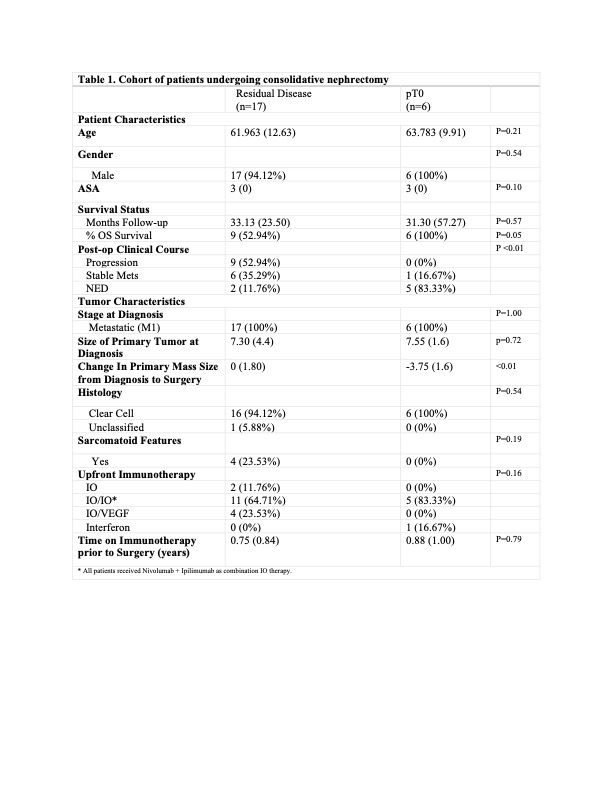Back
Therapeutics- Systemic (Ablation, Interventional Radiology, Medical Oncology, Radiation Therapy, Surgery, Urology)
34: Characterization of Patients Undergoing Consolidative Nephrectomy after Immunotherapy
Location: Poster Hall, Board D2
Width: 


Stephen Reese, MD
Fellow
Memorial Sloan Kettering Cancer Center, United States
Poster Presenter(s)
Background: There remains uncertainty around how to manage patients who experience complete or partial responses after systemic therapy and then undergo consolidative nephrectomy.
Methods: We conducted a single-institution (Memorial Sloan Kettering Cancer Center) retrospective analysis of patients treated with immunotherapy with metastatic cancer at the time of treatment (n=23). Patients were stratified based on final surgical pathology given presence of residual disease or pT0. Overall survival (OS) was calculated by the Kaplan-Meier method
Results: All patients had metastatic disease at presentation and almost all had clear cell histology (n=22). All patients who had pT0 at time of surgery were treated with combination ipi + nivo, were on systemic therapy for almost a year prior to surgery and had a significant change in size of primary tumor (-3.75cm). 14 patients (60.87%) had stable mets or were NED after surgery. Median follow-up after surgery was 33 months. Median OS was not reached at time of follow-up, however survival was 52% for patients with residual tumor and 100% for pT0 patients.
Conclusions: Patients with metastatic disease who demonstrated partial or complete response after immunotherapy and subsequently underwent consolidative nephrectomy had durable overall survival at follow-up, including a sub-set of pT0 patients who were all alive at follow-up.
Methods: We conducted a single-institution (Memorial Sloan Kettering Cancer Center) retrospective analysis of patients treated with immunotherapy with metastatic cancer at the time of treatment (n=23). Patients were stratified based on final surgical pathology given presence of residual disease or pT0. Overall survival (OS) was calculated by the Kaplan-Meier method
Results: All patients had metastatic disease at presentation and almost all had clear cell histology (n=22). All patients who had pT0 at time of surgery were treated with combination ipi + nivo, were on systemic therapy for almost a year prior to surgery and had a significant change in size of primary tumor (-3.75cm). 14 patients (60.87%) had stable mets or were NED after surgery. Median follow-up after surgery was 33 months. Median OS was not reached at time of follow-up, however survival was 52% for patients with residual tumor and 100% for pT0 patients.
Conclusions: Patients with metastatic disease who demonstrated partial or complete response after immunotherapy and subsequently underwent consolidative nephrectomy had durable overall survival at follow-up, including a sub-set of pT0 patients who were all alive at follow-up.
